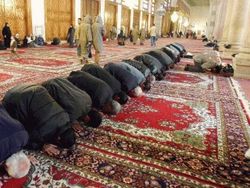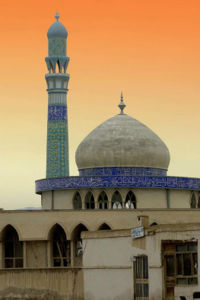Religious functions

Prayers

All adult Muslims are required to offer prayer, or salah, at least five times each day. Although some smaller mosques with smaller congregations will offer only a few prayers, most mosques offer all five required prayers daily: before sunrise (fajr), at midday (dhuhr), in the afternoon (asr), after sunset (maghrib), and in the evening (isha'a). Muslims are not required to offer prayer inside a mosque, but according to hadith, offering prayer in congregation at a mosque is considered more virtuous than offering prayer alone.

( Picture showing, Muslims performing salat (prayer) )

In addition to holding the five obligatory daily prayers, mosques hold jumuah prayers, or Friday prayers, which replace the midday prayer as the second required prayer on Fridays. While the ordinary daily prayers can be performed at any location, it is required that all adult men attend Friday prayers at the mosque.

A funeral prayer, or salat ul-janazah, is held for a deceased Muslim at the mosque, with all congregants present, including the imam, participating. Unlike with the daily prayers, the funeral prayers are normally held outdoors in a courtyard or square close to the mosque. During solar eclipses, mosques will host another special prayer called salat ul-kusuf.

There are two large holidays, or eids, in the Islamic calendar: Eid ul-Fitr and Eid ul-Adha. On both of these days, there are special prayers held at mosques in the morning. The eid prayers are supposed to be offered in large groups, and so larger mosques will normally host eid prayers for their congregants as well as the congregants of smaller local mosques.

Some mosques will even rent convention centers or other large public buildings to hold the large number of Muslims who attend the eid prayers. Mosques, especially those in countries where Muslims are the majority, will also host eid prayers outside in courtyards or town squares.
Ramadan events

(Picture above, click to enlarge - A mosque in Afghanistan )

Islam's holiest month, Ramadan, is observed through many events. As Muslims must fast during the day during Ramadan, mosques will host iftar (break-fast) dinners after sunset and the fourth required prayer of the day, maghrib. Food is provided, at least in part, by members of the community, thereby creating nightly potluck dinners. Because of the community contribution necessary to serve iftar dinners, mosques with smaller congregations may not be able to host the iftar dinners daily.

Some mosques will also hold suhoor meals before dawn to congregants attending the first required prayer of the day, fajr. As with iftar dinners, congregants usually provide the food for suhoor, although able mosques may provide food instead. Mosques will often invite poorer members of the Muslim community to share in beginning and breaking the fasts as providing charity during Ramadan in Islam is especially honorable.

Following the fifth and final required prayer of the day, isha, special, optional tarawih prayers are offered in larger Sunni mosques. Shi'a mosques, however, do not observe tarawih prayers. During each night of prayers, which can last for up to two hours each night, a member of the community who has memorized the entire Qur’an will recite a segment of the book.

During the last ten days of Ramadan, larger mosques will host all-night programs to observe Laylat al-Qadr, the night Muslims believe the Islamic prophet Muhammad first began to receive the Qur'an.

On that night, between sunset and sunrise, mosques will employ speakers to educate congregants in attendance about Islam. Mosques or the community usually provide meals periodically throughout the night.

During the last ten days of Ramadan, larger mosques within the Muslim community will host i'tikaf, a practice in which at least one Muslim man from the community must participate. Muslims performing i'tikaf are required to stay within the mosque for ten consecutive days, often in worship or learning about Islam. As a result, the rest of the Muslim community is responsible for providing the participants with food, drinks, and whatever else they need during their stay
Charity

The third of the Five Pillars of Islam states that Muslims are required to give approximately one-fortieth of their wealth to charity as zakat. Since mosques form the center of Muslim communities, they are where Muslims go to both give zakat and, if necessary, collect zakat. Prior to the holiday of Eid ul-Fitr, mosques also collect a special zakat that is supposed to assist in helping poor Muslims attend the prayers and celebrations associated with the holiday.